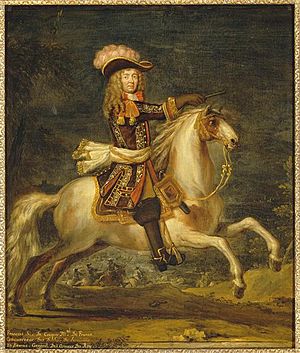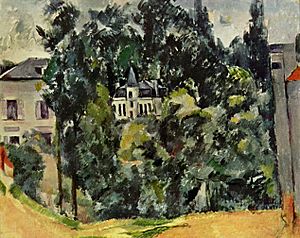François de Créquy facts for kids
Quick facts for kids
François de Blanchefort de Créquy, Marquis de Marines
|
|
|---|---|

François de Blanchefort de Créquy, Marquis de Marines by Joseph Parrocel
|
|
| Born | 2 October 1629 Poix-de-Picardie Picardy |
| Died | 3 February 1687 (aged 57) Paris |
| Buried |
Church of Jacobins Saint-Honoré
|
| Allegiance | |
| Service/ |
Army |
| Years of service | 1648-1684 |
| Rank | Marshal of France 1668 |
| Battles/wars |
Ortenbach War of the Reunions 1683-1684
|
| Awards | Order of the Holy Spirit |
| Signature | |
François de Blanchefort de Créquy (born October 2, 1629, died February 3, 1687) was an important French noble and soldier in the 1600s. He served during the many wars of Louis XIV of France, also known as the Sun King.
His family was very powerful and well-connected. His grandfather, Charles I de Blanchefort, was also a Marshal of France, a very high military rank. François and his older brother, Charles III de Créquy, supported the king during a civil war called the Fronde (1648-1653). Because of this, his brother became a close advisor to King Louis XIV. François himself had a very successful military career.
He became a Marshal in 1668. However, he was often compared to other famous French generals of his time, like Condé and Turenne. He lost some favor with the king in 1672 but was later brought back into service. He retired from the army in 1684 and passed away in Paris in 1687.
Contents
Early Life and Family
François de Blanchefort de Créquy was born in Poix-de-Picardie, France, on October 2, 1629. He was the youngest of three sons. His father was Charles de Blanchefort and his mother was Anne Grimoard du Roure.
His family came from a place called Créquy in Artois. This area was part of the Spanish Netherlands until France took it over in 1659. Many members of the Créquy family served in armies across Europe.
François's grandfather, Charles I de Blanchefort, was a trusted advisor to Louis XIII of France, King Louis XIV's father. He was a Marshal of France and led French troops to victory in 1636. François's own father died in battle in 1630.
His oldest brother, Charles III de Créquy, became one of King Louis XIV's closest advisors. Charles's wife was also a chief lady-in-waiting to Queen Maria Theresa of Spain. His middle brother, Alphonse, had a less famous career than his siblings.
In 1657, François de Créquy married Catherine de Rougé. They had two sons. Sadly, both sons died young. François Joseph was killed in battle in 1702, and Nicolas Charles died from illness in 1696. In 1659, François bought the land of Marines, Val-d'Oise and became the Marquis de Marines.
Military Career
The 1600s were a time of many conflicts in France. There were internal struggles and wars with other countries. One major event was the Fronde, a civil war from 1648 to 1653. It was a fight for power between powerful nobles and the king's court. The war with Spain also continued during this time.
Like his older brother, François de Créquy supported the king during the Fronde. By 1658, he had become a Lieutenant-General. He led the French right side of the army under General Turenne at the Battle of the Dunes in June 1658. This was a big victory that helped end the war with Spain in 1659. After this, de Créquy bought the Chateau of Marines. He added beautiful gardens designed by André Le Nôtre, a famous landscape artist.

Rise to Marshal
In September 1667, during the War of Devolution, a French army captured the important town of Lille. The Spanish army arrived too late to help. General Turenne sent cavalry led by Bellefonds and de Créquy to stop the Spanish retreat. They caused many casualties to the Spanish. King Louis XIV was so excited by this victory that he immediately promoted Bellefonds, Humières, and de Créquy to Marshal of France.
France gained a lot of land in the Spanish Netherlands. However, a group of countries led by the Dutch Republic formed an alliance. They forced France to give back most of the land in 1668. After this, King Louis XIV began planning to attack the Dutch Republic directly.
Challenges and Return to Service
As part of the king's plans, de Créquy led an army that took over the important Duchy of Lorraine in August 1670. By early 1672, France was ready for war. However, the king's promotions caused problems. Marshals were only under the king's direct command. This meant they could not serve under another Marshal. There were more Marshals than available positions, leading to arguments over who was in charge.
When Turenne was made commander of the invasion force in April 1672, Bellefonds, Humières, and de Créquy refused to serve under him. All three were sent away from the king's court. De Créquy retired to his home at Marines.
The Franco-Dutch War began in May 1672. At first, France seemed to be winning easily. But by July, the Dutch had strengthened their position. Other countries, like the Holy Roman Empire and Spain, joined the war against France. As the war grew, de Créquy returned to service in 1673.
He tried to help the city of Trier but was defeated at the Battle of Konzer Brücke in August 1675. Despite fighting his way into the town to help defend it, the soldiers there were not paid and were starving. They forced him to surrender in September. This was a small defeat, but it was remembered and even mentioned at King Louis XIV's funeral.
Later Victories
Even though the defeat at Trier hurt his reputation, de Créquy was given a new command in early 1678. This was because General Turenne had died in 1675, and Condé had retired. Peace talks were happening, and King Louis wanted to make his position stronger.
De Créquy was told to avoid big battles. His main goal was to keep Freiburg, a city he had captured in November 1677. An Imperial army of 30,000 soldiers was threatening Freiburg. De Créquy won two quick victories against this army at Rheinfelden and Ortenbach. He forced the enemy back and then captured Kehl and its bridge over the Rhine River.
These successes helped restore his good name. In 1681, he oversaw the siege of the Fortress of Luxembourg. He withdrew after France took Strasbourg, but then captured Luxembourg during the War of the Reunions in 1684. This was his last military action.
François de Créquy died in Paris on February 3, 1687. His brother Charles died just ten days later. François and his wife were buried in a church in Paris. Their memorial was designed by famous artists and can still be seen today at the Church of Saint-Roch.
The English writer John Dryden even mentioned de Créquy in his 1678 play, Mr. Limberman or the Kind Keeper.
Images for kids
See also
 In Spanish: François de Créquy para niños
In Spanish: François de Créquy para niños
 | William M. Jackson |
 | Juan E. Gilbert |
 | Neil deGrasse Tyson |

